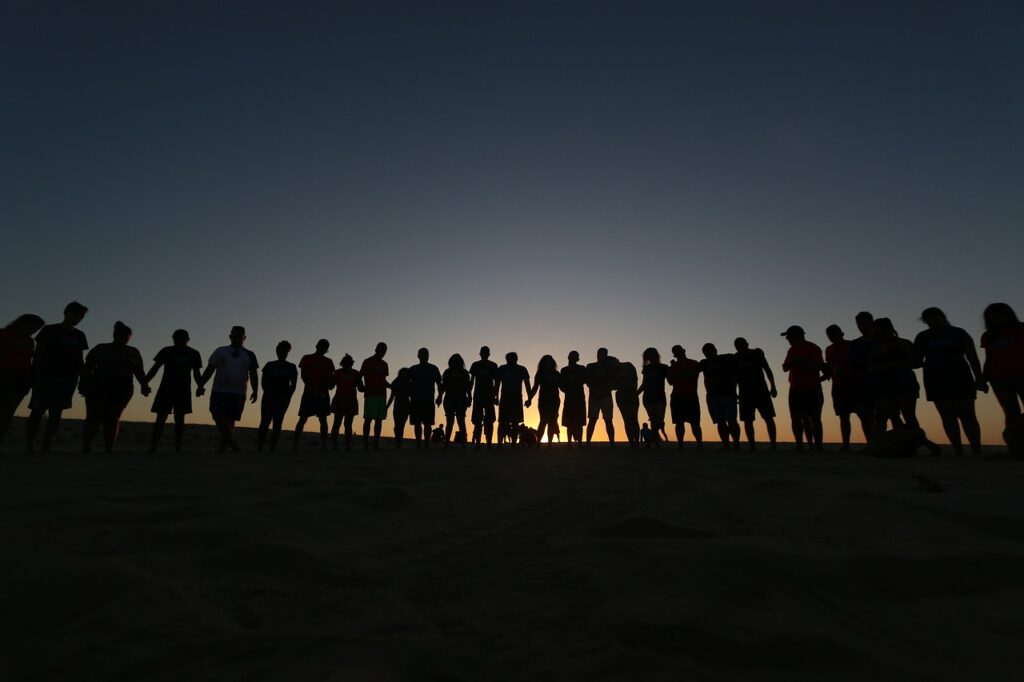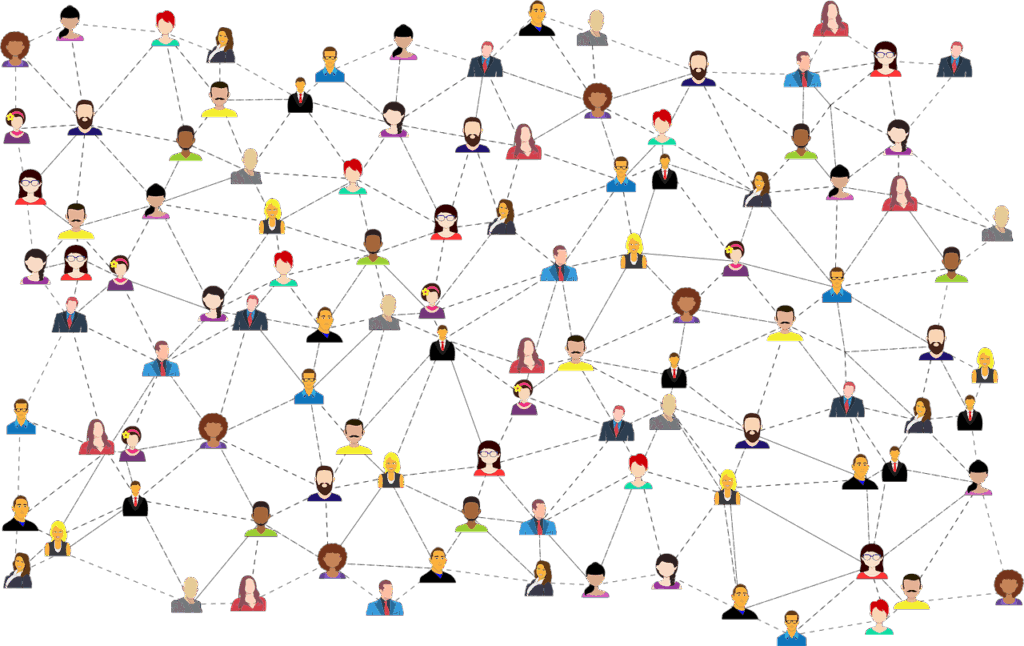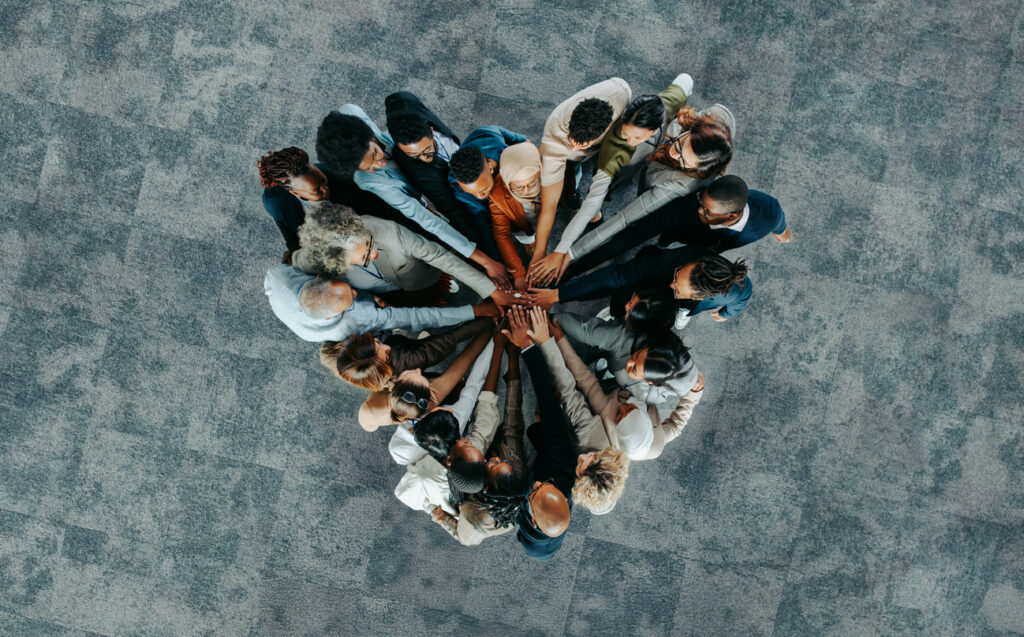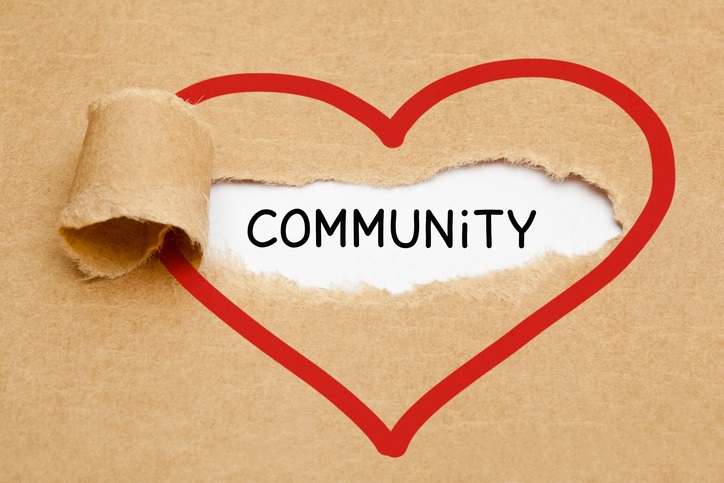Business Can Be the Ultimate American Community Organizer
Originally published on CenterForSocialCapital.com
Leaders are successfully proving the case for community-driven capitalism.
“For me, accessibility is the foundation of community.” —Vince Barsolo
A culture of camaraderie, connectedness and shared positive purpose results in extraordinary success in the workplace and spills out into every aspect of society. Businesses cannot succeed if they do not create a network of real and organic connections through their business model that extend into every sector of society to bring people together. If they do, they not only can strengthen their brand and their internal infrastructure but their benefits to their workers, their customers and society as a whole. And with disconnection at the heart of a myriad of different social ills, that’s more important and can be more efficacious than ever.
Just ask Vince Barsolo, CEO of Televerde, a global B2B sales and marketing company that serves an impressive slate of enterprise clients with a bold and profitable employment model heavily rooted in second-chance employment. Incarcerated women make up 60% of its global workforce, with an impressively low recidivism rate of less than 7%. Under Barsolo’s leadership, Televerde has become a living case study in how business can be both profitable and people-centric connectors.
“To me, Televerde has always felt like a family, and that’s something we protect,” Barsolo proudly declares. “Each quarter, we bring all employees together for a companywide town hall. Half the time is spent on business updates, and the other half is dedicated to recognition. What makes it powerful is that recognition isn’t top-down — employees nominate one another and explain, live, why that person made an impact. That kind of peer validation builds pride and trust. And in every town hall, employees participate in Voices of Televerde, sharing why they’re here and what this work means to them. These touchpoints strengthen ties and remind everyone they belong to something bigger.”
And belonging, as recent research from Harvard’s Making Caring Common project that we featured last month in our empathy article, is more critical than ever. In late 2024, the project revealed that 21% of adults reported serious problems with loneliness, defined by U.S. Surgeon General Vivek Murthy as “a subjective distressing experience that results from perceived isolation or inadequate meaningful connections.”
Televerde’s model directly addresses that crisis — not by just creating jobs but by building community. Barsolo visits every prison-run center each quarter, delivering updates face-to-face and listening to the women’s stories. Alumni often join him, offering a testament to what’s possible after reentry.
“You can hear a pin drop,” he says. “The women see living proof of what’s possible when they reenter society.”
That visibility and accessibility are intentional. In keeping with this, Barsolo declined a private office when he became CEO, choosing instead to remain in the open workspace. “I want people to see me, stop me in the hall, and bring me their ideas or concerns. That openness is what keeps the family feeling alive,” he says.
But Televerde’s community building doesn’t stop at its internal culture. It extends to clients, partners and the broader public. When enterprise clients visit Televerde’s prison-run centers, they’re often stunned — not by the environment but by the humanity.
“They come in expecting to see ‘inmates’ and instead meet women who feel familiar — women who want to support their families, succeed in their careers and make their way in the world just as they do,” Barsolo explains. “That realization creates empathy and connection.”
Clients also engage with the Televerde Foundation, launched in 2020 to support reentry and long-term success. Twice a year, they hear directly from women about the obstacles they’ve overcome and the careers they’re building.
“I’ve had friends and clients attend and be moved to tears,” says Barsolo. “These are people who don’t usually cry. That’s when it hits them: They’re not just buying a service. They’re investing in a woman, her children, and the ripple effect of her success.”
Community-Driven Capitalism Is the Future – And How It Was Meant to Be
That may seem like an extraordinary and unexpected situation in a for-profit company. But that kind of community support is the way capitalism actually is supposed to work, according to Adam Smith, who believed that capitalism needed to be good for society on the whole to work correctly. And the value that Smith placed on community was immense.
In his Theory of Moral Sentiments, Smith famously wrote, “Though it may be true, therefore, that every individual, in his own breast, naturally prefers himself to all mankind, yet he dares not look mankind in the face, and avow that he acts according to this principle …. he must upon … all … occasions, humble the arrogance of his self-love, and bring it down to something which other men can go along with.”
Happiness for Smith depends on the happiness of others. And to be successful, we must be connected to what our family, friends and neighbors think, believe, need and want; and be committed to wanting and working toward the benefit of all those stakeholders and players in our own happiness.
It’s a complex relationship Smith describes, to be sure. But then, being human and living in a human society is extremely complicated.
And so is running a successful business.
In the last decade or so, we have seen plenty of proof that tapping into different communities and showing support for their shared set of values can be effective and profitable for promotion and marketing as well as customer support. Consumers today expect deeper interaction with the company and a like-minded community of buyers. In fact, a study a few years back by First Round Capital found that 80% of startup founders reported building a community of users was important and 28% described it as crucial to their success.
That idea is at the heart of a new book by renowned venture capitalist Brad Feld, co-founder of Foundry Group, a Boulder-based VC firm managing more than $4 billion in assets, and a key figure behind Techstars, one of the world’s leading startup accelerators.

“The idea of living a life of abundance and not of scarcity comes down to just how you see the world, and how you believe in each other, and believe in what we can be and what we can do.” —Richard Moore (Image: Pixabay/ Nino Souza Nino)
In Give First: The Power of Mentorship, Feld details a philosophy that’s reshaped how many think about entrepreneurial success. The core idea: Give your time, expertise and support without expecting an immediate return. You can still expect the value to come back — just not always in predictable ways.
In a world increasingly defined by transactional motives, Give First reminds us that the most enduring impact comes from leaders who invest in others — especially in the community of entrepreneurs striving to create meaningful change. That’s not altruism. It’s strategic legacy-building.
“I strongly believe that startup communities can be built in any city,” states Feld in his book, “and the future economic progress of cities, regions, countries and society at large is dependent on creating, building and sustaining startup communities over a long period of time.”
Honoring the Social Capital Leaders Who Build Real Community
So, obviously, we know community is important, but we wanted to take a little bit of a deeper look at how some companies developed that “crucial” element and fostered it internally and/or externally in very organic and authentic ways that were a direct result of their social capital commitment to people-centric business strategies.
We rounded up a few Social Capital leaders and honored them this month as important and powerful voices who show a profound commitment to building a successful and prosperous community in different ways. We hope you find their thoughts and words not only instructive and helpful but inspiring and uplifting.
And we are pretty sure that Adam Smith would find it so, too.
Vince Barsolo, CEO at Televerde
Televerde is a unique company. Most of our workforce consists of incarcerated women working inside prison-run call centers, while the rest are in corporate offices around the world. My job is to make sure those two groups feel like one community.
To me, Televerde has always felt like a family, and that’s something we protect. Each quarter, we bring all employees together for a companywide town hall. Half the time is spent on business updates and the other half is dedicated to recognition. What makes it powerful is that recognition isn’t top-down — employees nominate one another and explain, live, why that person made an impact. That kind of peer validation builds pride and trust. And in every town hall, employees participate in Voices of Televerde, sharing why they’re here and what this work means to them. These touchpoints strengthen ties and remind everyone they belong to something bigger.
For our prison-run centers, visibility is key. I go to every center each quarter to deliver updates face-to-face, answer questions and hear what women are working on — which they love to tell me about. For many, it’s their first exposure to corporate life, so the lessons feel especially meaningful. Alumni often join me, and the entire room goes silent when they speak. You can hear a pin drop. The women see living proof of what’s possible when they reenter society.
For me, accessibility is the foundation of community. That’s why I chose to not take a private office when I stepped into this role. I want people to see me, stop me in the hall, and bring me their ideas or concerns. That openness is what keeps the family feeling alive.
We Bring Our Customers into Our Community
We open the doors and invite them in. When clients visit our prison-run operations for the first time, they’re often surprised. At first glance, our centers look like any other call center. The difference is that the people at the desks happen to be incarcerated. The experience dramatically changes perspectives. Many describe it as life-changing because it reframes their view of incarceration. They come in expecting to see “inmates” and instead meet women who feel familiar — women who want to support their families, succeed in their careers and make their way in the world just as they do. That realization creates empathy and connection, changing how clients think about opportunity and second chances.
We welcome clients into our non-incarcerated offices in Phoenix, Glasgow and Córdoba. There, the feedback is consistently about the teams’ passion, skill and expertise. While the experience is different, the outcome is the same: Clients leave with a stronger sense of connection to our people and the community they’ve become part of.
We also encourage clients to join us at Televerde Foundation events. Televerde launched the Foundation in 2020 to prepare women for reentry and to stay engaged with them for as long as they need support. Twice a year, our clients hear directly from women about the obstacles they’ve overcome and the careers they’re building. Those stories are powerful. I’ve had friends and clients attend and be moved to tears. These are people who don’t usually cry. That’s when it hits them: They’re not just buying a service. They’re investing in a woman, her children and the ripple effect of her success.
For some clients, that connection goes even further when they hire Televerde program graduates into their own organizations. That’s community coming full circle. Women not only get a second chance but also a new future with companies that already believe in their potential.
Building an Extended Community
At Televerde, we want our employees to feel supported not only at work but in the communities where they live. That’s why every corporate employee gets two paid volunteer days each year to use however they choose. Some spend that time with the Televerde Foundation, but many choose local nonprofits, schools or causes that are personal to them. The choice is theirs.
What’s been exciting is seeing leaders turn those days into team-building opportunities. Whole departments will volunteer together at food banks or community centers. At our executive retreats, we also make giving back part of the agenda by packing meals for families in need or helping prep for a fundraiser. It’s good for the community, but it’s also good for us. Serving side by side creates shared experiences outside the office that build stronger bonds inside the office.
For me, the point is simple: when people feel connected to the communities around them, they bring that energy and perspective back to work. It makes us better colleagues and a stronger company.

Lynda Resnick, Co-Owner at The Wonderful Company
In the Central Valley of California, our people do the hard work of feeding our nation. Their children deserve every opportunity. Wonderful Career Pathways is one of the many ways we are committed to ending the cycle of poverty by taking a holistic view and focusing on the social determinants of a healthy society. This program empowers students to enter college with 60 credits and a two-year head start on classes — or graduate high school and step right into higher-paying jobs in healthcare, education and agriculture. And Wonderful is with them every step of the way.
Richard Moore, President & CEO at Good Feet Store
I love that aspect of giving back as a company and supporting causes in our community and nationwide. We should do it — but it shouldn’t stop there. Servant leadership is actually thinking about the well-being of our employees, of my board members, of my partners. And that, then, will actually see a positive outcome on their production, on how they relate with me and how we achieve.
For me, it boils down to helping people live a better life, helping people do the things that they want to do. And those people are definitely our customers, but they’re also our partners, our employees and, for us, franchisees.
A lot of folks think servant leadership is “What will we do for our nonprofit? What will we as a company give back to causes that makes us feel great about working really hard over here and making a lot of money?”
This is the give back part of the conversation. It is the investment part of it. It is the piece that matters to bottom-line numbers. And I think that’s the most important piece that people sometimes get lost on when they think about this in that way. For me, the idea of living a life of abundance and not of scarcity comes down to just how you see the world, and how you believe in each other, and believe in what we can be and what we can do.
If you live a life of scarcity, you’re always going to worry. You’re always going to try to take your piece of the pie. And somebody else is after it. So then, you spend your energy defending what really wasn’t yours to begin with, right? Or defending what you clawed for and took from someone else. But that is draining, that is tiring, that’s not fun. And then, are you a good dad when you come home after living a workday like that? Are you a good husband, a good wife? You’re just not.
If you flip it on its head and say, “Hey, let’s live a life of abundance. How do we create a win for all of us?” might I on occasion get a few less pieces of the pie than my partner or my associate or the customer? Maybe. But I think, over time, it creates more pies and I think it creates more opportunity.
And guess what? That’s capitalism. That is the fundamental piece of capitalism. People have said, “No, no, no. It’s greed, greed, greed. Take, take, take.” No; it’s to create a machine that continually grows, continually gives people an opportunity to level up in any way that they think is up, right? And I think that’s the beauty of it.
Jamie Ratner, Founder & CEO at CertifiKID Holdings, LLC
At Macaroni KID, our whole business is about community. From our HQ team to our publisher community, we focus on staying connected and supporting each other. This creates a strong internal bond that spreads out to local communities. By working closely with our publishers and giving them the tools they need, we help them build their own vibrant local communities.
This strong foundation naturally extends to the businesses we work with and the parents who subscribe to Macaroni KID. We engage with our audience through social media, local events and community partnerships. We love hosting and joining events like family festivals, workshops and charity drives to build real relationships.
By focusing on what local parents need and creating spaces for them to connect, we strengthen our ties and make sure our community-first approach benefits everyone.
Payam Zamani, Founder, Chairman & CEO at One Planet Group
I’m a firm believer in the concept of community building, both at business but also in other spaces that you’re able to influence. Recently, I started a conference called One Planet Summit, which, basically, brings like-minded people who want to elevate business to serve humanity together so they can have the space to have these conversations. And I believe that collective success comes through collective unity. If you don’t have unity, it’s very difficult to together rise. And that is something we want to be able to achieve.
At work, the way we try to accomplish that is [through] whatever our business may be, and our primary businesses at One Planet are about online marketing. We’re not solving the problem of hunger in the world or finding cure for cancer, but we want to sign up for just causes. As a result, our employees, collectively, are working towards A, or more than one just cause. In our case, our just causes are healing racism in America. I see racism as the most challenging issue in this country; it’s very important for us to work towards that.
The second thing is empowering women and girls globally. These are just causes. And just because we are good at online marketing, we don’t believe that we should go out there and do our own projects; rather, we want to find grassroot projects, operations that we can support. Hopefully, with our support they can do more of the good work that they are already doing.
The other thing is collective service. Collective service can contribute to that community-building effort. In our company, what we do is offer up to nine paid service days to our employees. On those days, together or individually, we serve humanity however we see fit. There’s one thing we ask our team not to do on those days, and that is to please not serve a political party on those days, because by nature they’re divisive. That community-building is, as a result, built on the foundation of serving others together.
Bob Dalton, Founder & CEO at Sackcloth & Ashes
When building a community, one of the most important questions you can ask is, “What type of value are we bringing people to make them want to be a part of our community?”
This question gets to the heart of what makes a community special. When people are feeling valued, which unfortunately isn’t often nowadays, they not only work more effectively, but it creates a positive culture and environment that they work within.
A company that’s generous with its team members creates a generous community. As cliché as it may be at this point, a play on President John F. Kennedy’s quote in relation to this topic would be, “Ask not what your people can do for you, but ask what you can do for your people.”
Peter Block writes in his book Community that the goal isn’t community; the goal is belonging. People are asking three questions when it comes to belonging:
- Do you see me?
- Do you hear me?
- Does what I say mean anything to you?
Your executive team is asking those questions. Your team members are asking those questions. Your customers are asking those questions. Your family members are asking those questions.
If you want the hack to building strong relationships and communities, focus your efforts on making sure the people in your life and work can say, “Yes” to those three questions.

Brandon West, Founder & Chief Purpose Officer at PHOS Creative
Community is one of our core values at PHOS. It is something we build into our organizational rhythms, our culture and the way we show up for one another every day.
Even before someone walks through our doors, we want them to feel our commitment to investing in this core value.
When a new team member accepts a position at PHOS, we gather the entire team to record a welcome video. It starts with me congratulating them, building lots of excitement for their first day and letting them know how thrilled we are to have them join us. Then I turn the camera around with a little message from the team, and everyone erupts in a chorus of “WELCOME TO THE TEAM!” as we shout and celebrate.
No joke, people watch that video 10+ times before their first day. They send it to their family. They share it with friends. Because it communicates what we hope they’ll feel every day they are with us: You belong here.
We have branded a new hire’s first day as “Best First Day Ever” (BFDE). The day begins with a commissioning ceremony in our lobby. The whole team gathers as we speak words of welcome and purpose over them. With a lightbulb in hand, the new team member approaches our PHOS Light Wall, made up of 287 sockets spelling out “LIGHT,” each one representing a mission moment in our company. As they screw in their new lightbulb, we clap and celebrate them joining our community.
After the ceremony, we sit down for a two- to three-hour onboarding session where we walk through our mission, our vision, our values and our Business as a Ministry philosophy. When we get to our core value of community, I always tell them, “You’ll find as much community here as you’re willing to seek.”
The truth is: Loneliness is everywhere. The statistics are staggering. The majority of adults and the vast majority of leaders say they feel lonely. And yet, loneliness is surrounded by shame. It convinces us to stay silent. To hide. To believe we are the only ones.
We want PHOS to be a place where that shame is broken and community is found. A place where people can be honest about where they are. A place where community is not only available but actively offered. A place where no one walks alone.
You cannot force people to build community. But you can create the kind of culture where they are invited into a community of welcoming, warm people.
Building community is not about perks or programs. It is how we love our people. It is what we choose to value. And it is how we show up for one another on the hard days, not just the highlight reels.
At PHOS, we are committed to building that kind of community. Because we are not here just to make people happy. We are here to build a community where people can truly flourish.
Jasmine Jirele, President & CEO at Allianz Life Insurance Company of North America
Ask any CEO about the importance of community engagement, and you will hear resounding agreement about the opportunity to engage employees and make an impact on our communities — locally, nationally and, sometimes, even internationally. All companies strive to make a difference, but attaining this lofty goal is sometimes easier said than done.
While it is easy to write checks and hope for good outcomes, the best companies take a strategic approach to their community engagement, creating focus for maximum impact and change while activating their employees’ passion for giving back.
So, where do you begin? I am an advocate for a three-principle approach:
- Take an honest assessment of your efforts to understand your true impact.
- Align your community engagement strategy with your mission to enable your company to make a deeper impact through the work you do every day.
- Engage and activate your employees to bring more value to your partnerships and recognize and share the difference they make.
Our experience at Allianz Life continuously pointed us back to these principles, and it is my hope that this is meaningful to organizations of all sizes. Patience is key as it takes time and an ongoing ability to adapt to attain community engagement success.
[Jasmine shared a comprehensive strategy approach on community engagement in her article “Authentic Community Engagement Strategies for CEOs.”]


